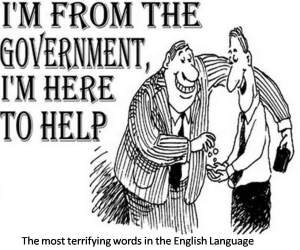What is the state for?



One of many views
The Venezuelan government headed East last week to beg for funds from the Chinese in order to save their Revolutionary State. Yet chavismo’s global treasure hunt, regardless of the outcome, is not the only race in town. All over the world politicians, scholars, businessmen and ordinary citizens are pondering a new purpose for the state, and what it is good for in this modern world of ours.
Assessing this issue has taken several centuries so far, reckoning three and a half revolutions in the process that have shaped the conception of the state’s purpose in a Society. Unlucky for Chavismo’s own legacy, their “revolution” isn’t part of any.
The three and a half revolutions were carefully considered in an interesting book by John Micklethwait and Adrian Wooldridge titled “The Fourth Revolution: The Global Race to reinvent the State“. Those three revolutions brought the creation of the Nation-State, the rise of the Liberal State, and the gestation of the Welfare State. The other half of the story according to these chaps from “The Economist” magazine was the elevation of monetarism in Britain and the US as a challenge to a global economy in doldrums facing stagflation in the 70s. But most importantly, Western civillization today faces stiff competition specially from Asia as the leading and efficient State.
China and Singapore based their model of governing on its effectiveness. An efficient State is one in which meritocracy is not compromised by the ballot box. This authoritarian way of governing has led to a remarkable improvement in the human condition, ranging from lifting millions out of poverty over the past 4 decades, to its much hailed scores on the PISA tests in education and so forth.
That is why Singapore selects only the best to become teachers, and the Chinese promote public officials according to merit, training them in America’s and Europe’s elite schools. This might also explain why some countries in Asia excel at delivering better and cheaper public goods in some cases than their European and North American counterparts.
Without granting the authoritharian regimes a superiority vis-a-vis Democracy, the main theme of the book is the West’s inability to respond to a changing environment. Citizens are fed up with the way their Government is (not) working. This generalized sentiment explains why people believe that things may not change at all, a common belief in our 2015 Venezuela.
Coming back to Venezuela, there is no doubt the State has failed miserably at protecting its citizens from rampant violence, economic malaise, securing property rights, or guaranteeing a level playing field that could foster long-run growth. Instead of pleading for more foreign debt to be spent on useless ends, Venezuela should consider how Brazil’s conditional cash-transfer scheme helps alleviate poverty rates, reduce inequality and transform the life of the poor; or how Norway created a Sovereign Wealth Fund in the mid 90s that is now hovering around $700 billion. Even countries that three decades ago were worse off than Venezuela was back then have marvellous examples to offer – Chile, Mexico, and Peru among others from the Americas.
Certainly, to move forward from our burdens we need a better Government, one that can transform into something useful, not wasteful. There’s no need for having 27 ministries, even less so fatuous deputy ministries such as the “Viceministerio para la Suprema Felicidad Social del Pueblo“.
Every crisis, regardless of its nature, brings up opportunities. This tumultuous 2015 must represent a time for leading political, economic and social actors to mull over the right role of the state, and how the public sector can embrace modernity in an era of promising development across the world.
Caracas Chronicles is 100% reader-supported.
We’ve been able to hang on for 22 years in one of the craziest media landscapes in the world. We’ve seen different media outlets in Venezuela (and abroad) closing shop, something we’re looking to avoid at all costs. Your collaboration goes a long way in helping us weather the storm.
Donate




